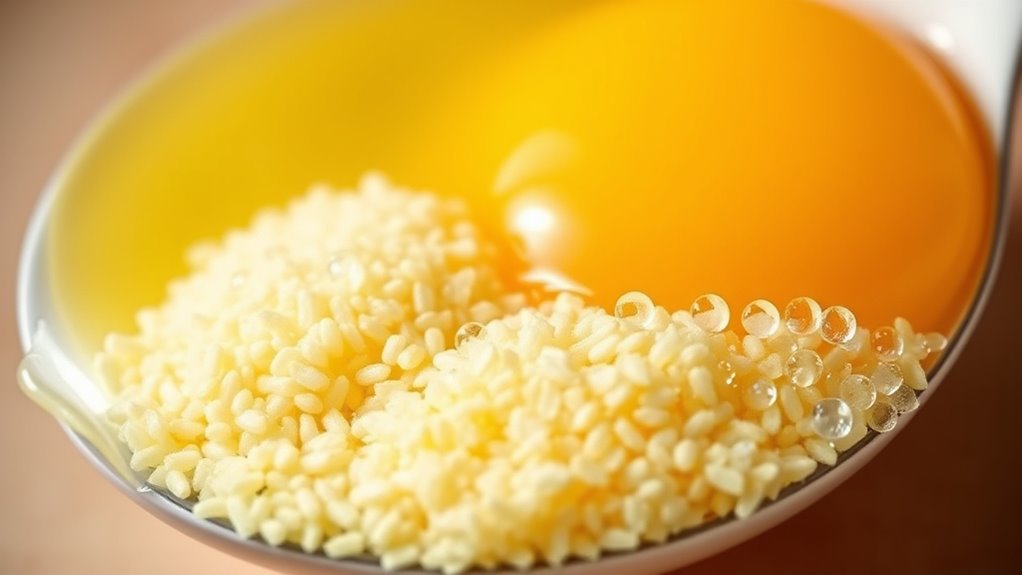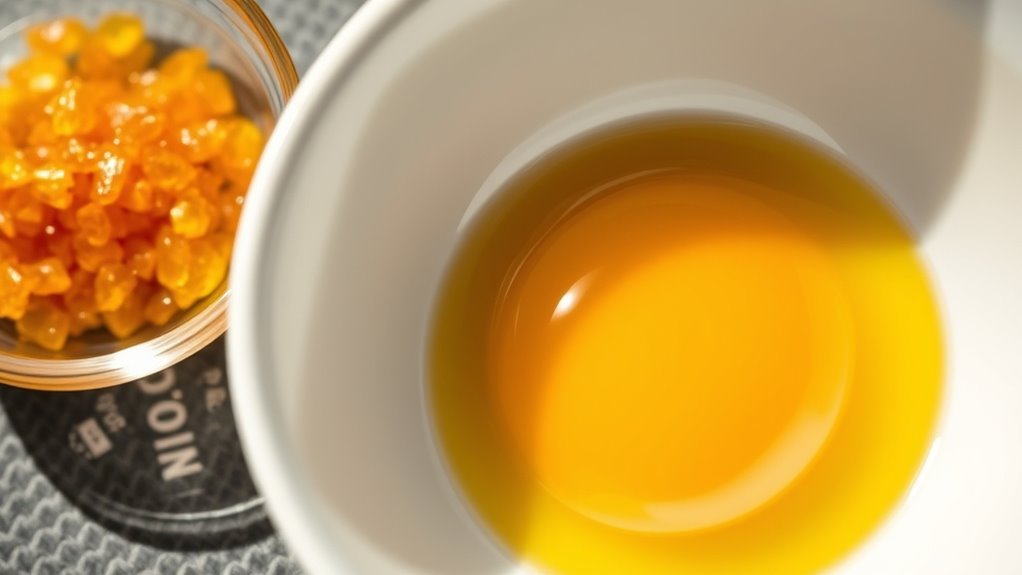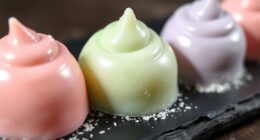Emulsifiers help mix oil and water-based ingredients by stabilizing their connection, and you’ll find them in foods like mayonnaise and ice cream. Egg yolks contain lecithin, a natural emulsifier that surrounds oil droplets to prevent separation. Industrial emulsifiers like polysorbate 80 are synthetic stabilizers used in many processed products for consistency and texture. To understand how these ingredients work together to keep your favorite foods smooth and stable, keep exploring further.
Key Takeaways
- Egg yolks contain lecithin, a natural emulsifier that stabilizes oil-water mixtures like mayonnaise.
- Lecithin, a phospholipid, surrounds oil droplets, preventing separation in food products and enhancing stability.
- Polysorbate 80 is a synthetic emulsifier used in processed foods and cosmetics to stabilize oil-in-water emulsions.
- Emulsifiers like lecithin and polysorbate 80 help improve texture, extend shelf life, and support large-scale manufacturing.
- Understanding emulsifiers explains how they create stable, uniform mixtures in foods, beverages, and cosmetic products.

Have you ever wondered how salad dressings stay mixed or how margarine remains smooth? The secret lies in emulsifiers, which are vital in food science for stabilizing mixtures of ingredients that normally don’t blend well. Emulsifiers are molecules that have a unique structure: one end is attracted to water (hydrophilic), and the other is attracted to fats or oils (hydrophobic). This dual affinity allows them to act as bridges, keeping oil and water dispersed evenly. In food production, emulsifiers play a indispensable role in creating consistent textures and extending shelf life. Their use isn’t limited to the kitchen; they have significant industrial applications as well, where they facilitate large-scale manufacturing of processed foods, cosmetics, and pharmaceuticals. Understanding emulsifier chemistry helps explain how these agents function at a molecular level to stabilize complex mixtures. Egg yolks are a classic example of a natural emulsifier. They contain lecithin, a phospholipid that’s highly effective at stabilizing emulsions. When you make mayonnaise or hollandaise sauce, lecithin helps blend oil and vinegar or lemon juice, preventing them from separating. The science behind this is fascinating—lecithin molecules surround tiny droplets of oil, forming a protective barrier that keeps the mixture uniform. This natural emulsifying property is why egg yolks are so valued in culinary and food science contexts. Industrially, lecithin is extracted from eggs or soybeans and added to various products to improve texture, consistency, and stability. Its applications extend to baked goods, chocolates, and even dietary supplements, where it acts as an emulsifying agent to make sure ingredients stay evenly distributed.
Polysorbate 80 is a synthetic emulsifier widely used in processed foods and pharmaceuticals. It’s a surfactant that effectively stabilizes oil-in-water emulsions, making it ideal for products like ice cream, salad dressings, and creams. In industrial applications, polysorbate 80 is favored because it’s reliable, cost-effective, and compatible with a broad range of ingredients. It also helps improve the appearance and mouthfeel of products, making sure they remain uniform over time. Because of its versatility, polysorbate 80 is essential in manufacturing processes where consistency is key, such as in the production of beverages and cosmetic creams. Its ability to maintain emulsion stability under various conditions makes it indispensable in the food science industry, where it supports mass production and quality control.
Frequently Asked Questions
Are Emulsifiers Safe for Long-Term Consumption?
Emulsifiers are generally safe for long-term consumption when they meet regulatory standards. You should be aware of potential health implications, such as allergies or sensitivities, especially with synthetic options like Polysorbate 80. Always check product labels and consume emulsifiers in moderation to minimize risks. Regulatory agencies, like the FDA, oversee safety standards, so choosing products that conform helps ensure your health isn’t compromised over time.
How Do I Identify Food Containing Artificial Emulsifiers?
Think of food labels as secret codes—reading ingredient lists is your best tool. Look for unfamiliar or chemical-sounding names like polysorbate 80 or sodium stearoyl lactylate. Recognize common additives that act as artificial emulsifiers, such as artificial flavors, stabilizers, or preservatives. By paying attention to these details, you can easily identify foods containing artificial emulsifiers and make healthier choices, avoiding unnecessary chemicals in your diet.
Can Emulsifiers Cause Allergic Reactions?
Yes, emulsifiers can cause allergic reactions in some people. Your immune system might recognize certain emulsifiers, like lecithin or polysorbate 80, as allergenic concerns, triggering immune responses. If you notice symptoms like hives, swelling, or difficulty breathing after consuming processed foods, check ingredient labels carefully. It’s important to stay aware of potential allergenic concerns and consult a healthcare professional if you suspect an allergy to any food additive.
Are Natural Emulsifiers as Effective as Synthetic Ones?
Think of natural emulsifiers like gentle rain nourishing a garden, while synthetic ones are like a precise sprinkler system. Natural emulsifiers, such as egg yolks and lecithin, can be quite effective, but their efficacy may vary compared to synthetic options like Polysorbate 80. You might find that natural emulsifiers work well in some recipes, yet synthetic ones often provide more consistent stability, making the choice depends on your specific needs.
How Do Emulsifiers Impact Gut Health Over Time?
Emulsifiers can impact your gut health over time by altering your gut microbiome and potentially increasing digestive inflammation. Consuming them regularly may disrupt beneficial bacteria, leading to imbalances that cause inflammation and digestive issues. While some emulsifiers are natural, synthetic ones might have a stronger effect. To protect your gut, consider limiting processed foods with emulsifiers and focusing on whole, unprocessed options.
Conclusion
Now that you understand how emulsifiers like egg yolks, lecithin, and polysorbate 80 work, you see they’re the unsung heroes behind smooth sauces and creamy dressings. Without them, your favorite foods might fall apart like a house of cards. So, next time you enjoy a perfectly blended dish, remember—these tiny agents hold the culinary magic together, turning chaos into harmony. Isn’t it amazing how something so small can make such a big difference?










